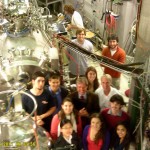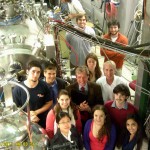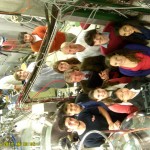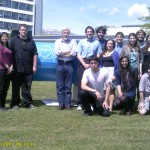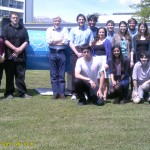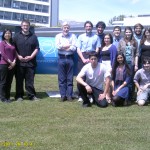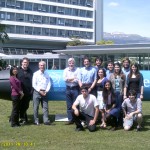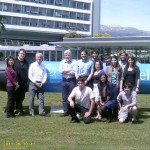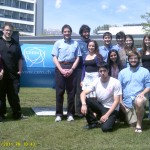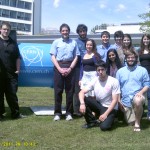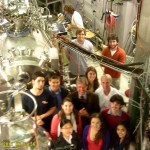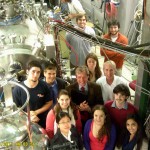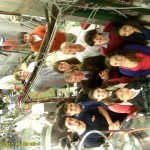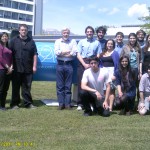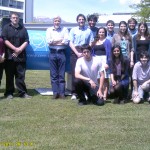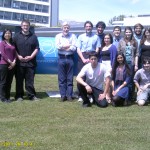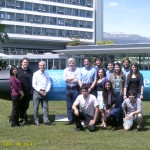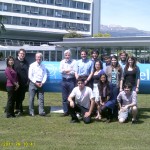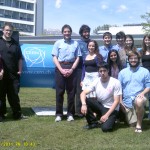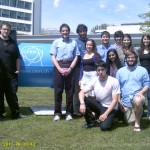In reference to UniGe classes:
-Look at the curriculums of the courses and choose what you want to take as soon as you get accepted. I go to Williams College and we have a different curriculum than BU. I ended up taking Quantum Mechanics at UniGe and my school and repeating a class is one of the most frustrating experiences one can have academically. If I had spoken up earlier (ie in September) about wanting to take another course in place of QM, I think I would have gotten a lot more out of my classes this semester. That being said, anyone who doesn’t go to BU shouldn’t be deterred from applying to this program – I think it has a lot to offer for a physics student from any university.
-The TAs are there to help you and are a lot more approachable than you think. I didn’t meet with them until the very end of the semester and wish I had met with them more to discuss homework questions during the semester. It’s their job to help you and make sure you understand everything, so use their knowledge to your benefit.
-Study during the semester – don’t slack off on your homework just because it’s not due and doesn’t have a grade. I was really focused on research and prioritized that over my classes, which is a decision I definitely don’t regret. However, studying for finals was extremely stressful (your entire grade depends on the final) because I had managed to do most of my hw in one class but only about half in the other class. If I had been studying harder for my classes during the semester, even just a couple more hrs per week, I wouldn’t have had a miserable 9 am to midnight in the library for two weeks finals period. I did do well in my courses but I would have felt a lot more comfortable going into the test if I had been studying all semester.
-Talk to the UniGe students. It’s wonderful to meet people from different countries and nice to have friends outside of the program as well. I didn’t get to know them until near the end of the semester and wish I had reached out to them sooner.
-When you do end up studying for finals, outlining the book and going over problem sets/past exams/practice exams was one of the best ways to study, for me at least. For orals, talking over the main concepts of the class and anything your professor asked you to focus on is really helpful – get two or three people together and teach each other things on the blackboard. In the oral exam, act confident, although steer away from cocky, and you’re likely to do well.
In reference to research:
-Choose an adviser who does something that you’re interested in but also try to choose an adviser who will have time to speak with you and help you out. My mentor was always available if I had questions and his graduate student was very helpful when I had questions about my code, which made research so much more enjoyable and productive.
-Don’t be afraid to talk to a bunch of people about what research you want to do in the beginning. After a couple weeks at CERN, you’ll have a couple contacts. Email them, set up meetings, or if you don’t know many people just ask for recommendations of who would make a good mentor. The experience of looking for a mentor is definitely part of your time at CERN, so take full advantage and don’t choose someone just because you don’t want to spend time exploring all of your options.
-Don’t be afraid to ask questions – you’re not expected to know everything about high energy physics, coding, hardware, etc and the easiest way to learn is to ask when you don’t understand.
-Attend meetings, go to conferences (I went to a high energy physics conference in Warsaw, Poland – one of my best trips the whole semester), do as much as you can while here. This program offers you the opportunity to immerse yourself in high energy physics in a way you can’t arguably anywhere else so you should take advantage of that as much as possible.
In reference to life here:
-Travel around Switzerland if you don’t have time/money to travel around Europe – it’s cheaper, you can take day trips, and Switzerland contains a lot of diverse areas from the Alps to the Italian part to the capital etc. Also take advantage of program planned trips – they’re much less expensive!
-Before you leave to come here, reflect on what you want to get out of the program. It helps to know what you expect to come out with and to revise that as you go along. I wish I had spent more time doing that – I dived into the program and didn’t really think too hard about it until a month or two in, when time had already passed.
-One of the easiest ways to cope with the change of moving here/meeting a bunch of new people is to find a way to do an activity that you normally participate in at home. CERN and UniGe offer many clubs – I joined the CERN Jazz Club because they granted me access to a piano, which allowed me to play whenever I wanted. I know other people who did a lot of outdoors activities, found a dance school to take classes at, found a church they enjoyed going to in the area, etc. It provides some sense of consistency with what you were previously used to and a venue to meet new people as well.
I couldn’t be happier with my time here – whether good or bad I learned something from every experience I’ve had this semester. If anyone has any questions about the program I’d be more than happy to answer them – just email me at aas1@williams.edu 🙂
-Alice

